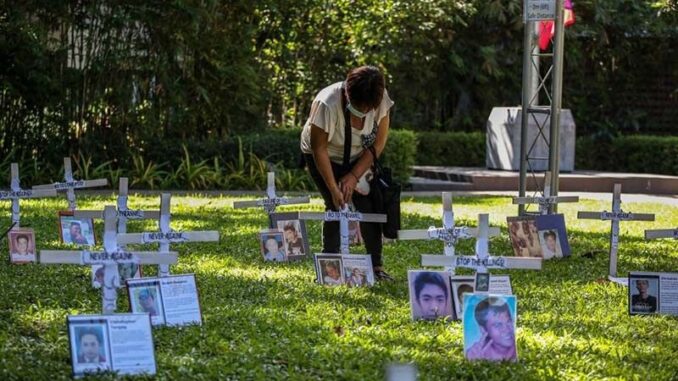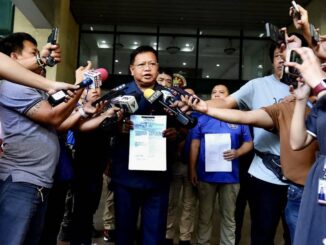
MANILA, Philippines — Former Philippine National Police chiefs in the administration of former president Rodrigo Duterte should clarify their roles in the bloody war on drugs, after the revelation of retired police lieutenant colonel Royina Garma of a cash reward system for killing drug suspects, PNP chief Gen. Rommel Francisco Marbil said yesterday.
Marbil issued the call to the former PNP chiefs following what he described as serious allegations made by Garma, that Duterte and other high-ranking officials of his administration sanctioned covert operations which replicated the “Davao model” of extrajudicial killings on a national scale.
“We take these allegations very seriously. We will thoroughly investigate Garma’s claims to ensure accountability and transparency within our ranks,” the police chief said in a statement.
Marbil said his predecessors should speak out, as he underscored the importance of restoring public trust in the PNP, particularly in light of the police force’s anti-drug campaign under the Marcos administration which focuses on high-impact operations while prioritizing human rights.
Garma, a former general manager of the Philippine Charity Sweepstakes Office (PCSO), revealed during a House quad committee hearing that Duterte talked to her about implementing his war on drugs in Davao on a nationwide scale, which had cash incentives ranging from P20,000 to P1 million for every drug suspect killed.
Duterte’s first PNP chief was Sen. Ronald dela Rosa, who implemented his anti-drug campaign in the early years of his presidency.
The other PNP chiefs in the previous administration were Generals Oscar Albayalde, Archie Francisco Gamboa, the late Camilo Pancratius Cascolan, Debold Sinas, Guillermo Lorenzo Eleazar and Dionardo Carlos.
Retired Lt. Gen. Vicente Danao Jr. was the officer-in-charge of the PNP at the tail-end of the Duterte administration.
During the quad committee’s hearing on Friday, Garma presented a matrix suggesting that former PNP chiefs were aware of the covert operations against drug suspects.
Garma revelations ‘just the tip of the iceberg’
Garma’s explosive testimony tagging Duterte about the reward system in the extrajudicial killings is just the tip of the iceberg, lawmakers said yesterday.
“Mind you, it’s just the tip of the iceberg – so to speak. It comes from the perspective of an insider who has not just the trust and confidence, or the eyes and ears of the former president, but even beyond that,” Rep. Jefferson Khonghun of Zambales’ first district remarked.
His colleague in the “Young Guns” bloc in the chamber, Rep. Francisco Paolo Ortega V, made the same sentiments, noting that Garma’s revelation gives Filipinos a peek into the inner workings of the Duterte administration..
Her testimony, delivered during a House quad committee hearing last week, intensified the probe into Duterte’s anti-narcotics drive.
The key figure identified in Garma’s testimony was Irmina Espino, also known by the alias “Muking” or “Moking.”
She testified that in 2016, Espino contacted her to obtain the contact information of then-Criminal Investigation and Detection Group (CIDG) Region 11 chief Col. Edilberto Leonardo, at Duterte’s request.
This occurred after Garma recommended Leonardo – her upperclassman at the PNP Academy – to Duterte to lead a national anti-drug task force, replicating the infamous Davao model.
“On the same day, a certain ‘Muking’ contacted me by phone to request Leonardo’s contact details, which I promptly provided,” Garma stated in her affidavit.
This set the stage for the formation of a national task force that replicated the Davao model of anti-drug operations – a system that reportedly rewarded officers for killings and provided funding for operational costs.
Garma explained that the Davao model operates on three levels of payments or rewards: a reward for killing suspects, funding for planned operations, and reimbursement of operational expenses.
During the hearing, quad committee co-chair and Santa Rosa City Rep. Dan Fernandez sought clarification, asking if “Muking” referred to Espino.
DOJ to probe killings
The Department of Justice (DOJ) will launch a preliminary investigation into cases of high-profile killings that were committed during the Duterte administration.
The killings were revealed during the quad committee hearings, particularly from Garma’s testimonies.
These include the 2016 deaths of three Chinese drug lords at the Davao Prison and Penal Farm, PCSO executive Wesley Barayuga, Tanauan mayor Antonio Halili and Albuera mayor Rolando Espinosa.
Justice Undersecretary Raul Vasquez, in a statement, said that the DOJ would begin the investigation and case build-up once Congress submits its committee report along with affidavits, or if a formal complaint is filed.
Vasquez said the police or private individuals could file the complaint and the DOJ will launch a probe as long as there is an “initiatory process.”
Garma pressured to link Duterte – Panelo
Former presidential chief legal counsel Salvador Panelo yesterday said that there was alleged pressure on Garma to execute her affidavit.
“It is my belief that there is pressure. She (Garma) is being threatened as she was forced to give such kind of allegations,” Panelo said in an interview with Teleradyo.
“If you will read her affidavit, it made it appear that (former) president Duterte had knowledge, but my suspicion was it was crafted by a lawyer so that the public will be convinced that he had a hand,” Panelo added.
“It will not stand in court in all probability. In short, she made that (allegation), as she was forced to tell false testimony, but will be junked once it reaches the court,” Panelo said.
Panelo cited many loopholes in Garma’s affidavit. He noted Garma has admitted she was not part of the group that carried out the “Davao model.”
He said that Garma’s testimony was all hearsay. “She has no personal knowledge, as all her accusations were just narrated to her,” he said, adding Garma was forced to testify against Duterte for fear of prolonged detention.
“There is a probability of prolonged detention, which to my mind, as a lawyer, is an unlawful detention as she was detained after she refused to answer the question ‘how close are you with (former) president (Duterte)?’ She refused to answer that as it was too personal and has no relevance in the investigation,” he said.
Former executive secretary Salvador Medialdea, for his part, said Garma was not the right person to talk about drug operations.
Medialdea said instead of talking about the Barayuga murder, Garma suddenly talked about alleged EJKs.
Group calls for Duterte arrest
Meanwhile, the Alliance of Concerned Teachers (ACT) said over the weekend that authorities need to arrest and prosecute Duterte and his “accomplices” for their alleged involvement in EJKs during the drug war from 2016 to 2022.
ACT called on the Marcos administration to hold Duterte accountable for the “horrific scale of state-sponsored violence.”
“Hundreds of children and youth were mercilessly swept away as collateral damage in Duterte’s tokhang carnage. We cannot stand idly by as the architects of these heinous crimes evade justice. The streets where children once played became their graves, and their futures were stolen in the name of a misguided war on drugs. It is time to hold Duterte accountable for the bloodshed that tore through families and communities,” said ACT chairman Vladimer Quetua.
ACT also urged the Marcos administration to cooperate with the International Criminal Court’s investigation into the drug war, which it previously opposed, possibly due to Marcos’ past close ties with Vice President Sara Duterte. — Delon Porcalla, Bella Cariaso, Neil Jayson Servallos, Edith Regalado





Be the first to comment